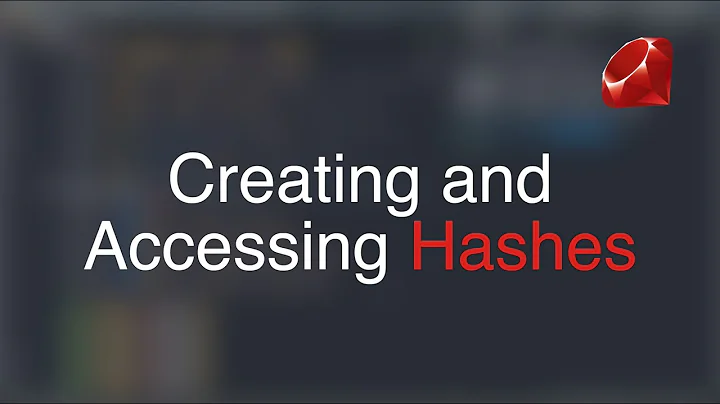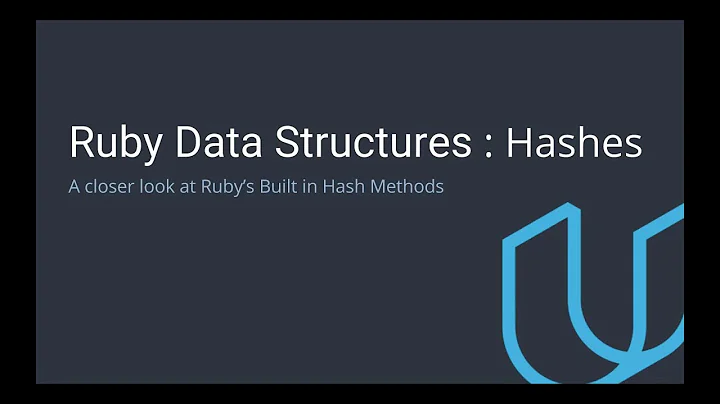Flattening nested hash to a single hash with Ruby/Rails
Solution 1
You could do this:
def flatten_hash(hash)
hash.each_with_object({}) do |(k, v), h|
if v.is_a? Hash
flatten_hash(v).map do |h_k, h_v|
h["#{k}.#{h_k}".to_sym] = h_v
end
else
h[k] = v
end
end
end
flatten_hash(:foo => "bar",
:hello => {
:world => "Hello World",
:bro => "What's up dude?",
},
:a => {
:b => {
:c => "d"
}
})
# => {:foo=>"bar",
# => :"hello.world"=>"Hello World",
# => :"hello.bro"=>"What's up dude?",
# => :"a.b.c"=>"d"}
Solution 2
Because I love Enumerable#reduce and hate lines apparently:
def flatten_hash(param, prefix=nil)
param.each_pair.reduce({}) do |a, (k, v)|
v.is_a?(Hash) ? a.merge(flatten_hash(v, "#{prefix}#{k}.")) : a.merge("#{prefix}#{k}".to_sym => v)
end
end
irb(main):118:0> flatten_hash(hash)
=> {:foo=>"bar", :"hello.world"=>"Hello World", :"hello.bro"=>"What's up dude?", :"a.b.c"=>"d"}
Solution 3
The top voted answer here will not flatten the object all the way, it does not flatten arrays. I've corrected this below and have offered a comparison:
x = { x: 0, y: { x: 1 }, z: [ { y: 0, x: 2 }, 4 ] }
def top_voter_function ( hash )
hash.each_with_object( {} ) do |( k, v ), h|
if v.is_a? Hash
top_voter_function( v ).map do |h_k, h_v|
h[ "#{k}.#{h_k}".to_sym ] = h_v
end
else
h[k] = v
end
end
end
def better_function ( a_el, a_k = nil )
result = {}
a_el = a_el.as_json
a_el.map do |k, v|
k = "#{a_k}.#{k}" if a_k.present?
result.merge!( [Hash, Array].include?( v.class ) ? better_function( v, k ) : ( { k => v } ) )
end if a_el.is_a?( Hash )
a_el.uniq.each_with_index do |o, i|
i = "#{a_k}.#{i}" if a_k.present?
result.merge!( [Hash, Array].include?( o.class ) ? better_function( o, i ) : ( { i => o } ) )
end if a_el.is_a?( Array )
result
end
top_voter_function( x ) #=> {:x=>0, :"y.x"=>1, :z=>[{:y=>0, :x=>2}, 4]}
better_function( x ) #=> {"x"=>0, "y.x"=>1, "z.0.y"=>0, "z.0.x"=>2, "z.1"=>4}
I appreciate that this question is a little old, I went looking online for a comparison of my code above and this is what I found. It works really well when used with events for an analytics service like Mixpanel.
Solution 4
In my case I was working with the Parameters class so none of the above solutions worked for me. What I did to resolve the problem was to create the following function:
def flatten_params(param, extracted = {})
param.each do |key, value|
if value.is_a? ActionController::Parameters
flatten_params(value, extracted)
else
extracted.merge!("#{key}": value)
end
end
extracted
end
Then you can use it like flatten_parameters = flatten_params(params). Hope this helps.
Solution 5
Or if you want a monkey-patched version or Uri's answer to go your_hash.flatten_to_root:
class Hash
def flatten_to_root
self.each_with_object({}) do |(k, v), h|
if v.is_a? Hash
v.flatten_to_root.map do |h_k, h_v|
h["#{k}.#{h_k}".to_sym] = h_v
end
else
h[k] = v
end
end
end
end
Related videos on Youtube
yerforkferchips
Updated on June 24, 2022Comments
-
 yerforkferchips almost 2 years
yerforkferchips almost 2 yearsI want to "flatten" (not in the classical sense of
.flatten) down a hash with varying levels of depth, like this:{ :foo => "bar", :hello => { :world => "Hello World", :bro => "What's up dude?", }, :a => { :b => { :c => "d" } } }down into a hash with one single level, and all the nested keys merged into one string, so it would become this:
{ :foo => "bar", :"hello.world" => "Hello World", :"hello.bro" => "What's up dude?", :"a.b.c" => "d" }but I can't think of a good way to do it. It's a bit like the
deep_helper functions that Rails adds to Hashes, but not quite the same. I know recursion would be the way to go here, but I've never written a recursive function in Ruby.-
kiddorails almost 10 yearsWill it be useful if you convert your hash in
OpenStructobject (the way Rails do it)? Edit: I now realized that it won't perform it recursively in object. But recursive-open-struct seems like a solution.
-
-
 yerforkferchips almost 10 yearsBrilliant, this saves me a day of headaches. And it's nice and simple.
yerforkferchips almost 10 yearsBrilliant, this saves me a day of headaches. And it's nice and simple. -
Oscar over 7 yearsAs a tip, I recommend using the gem 'humanize' to make the numbers more readable.
-
 yerforkferchips over 7 yearsThank you. My question was specifically for flattening hashes, though, and I actually didn't want arrays to be flattened for my use case back then.
yerforkferchips over 7 yearsThank you. My question was specifically for flattening hashes, though, and I actually didn't want arrays to be flattened for my use case back then. -
Oscar about 7 yearsNo worries. Actually, there's no mention of arrays in the original question at all
-
Dan R almost 7 yearsThanks for submitting, I found this very useful!
-
jgomo3 about 4 yearsExcellent. Probably you want to change the map for an each.
-
Mr. Demetrius Michael almost 2 yearsdoesn't work with nested array of hashes






